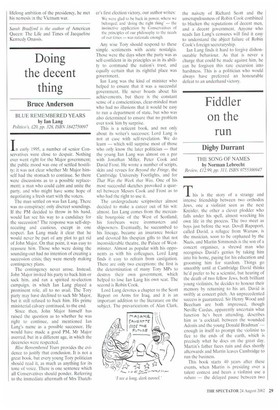A multitude of shapes but a single aim
Sarah Bradford
THE YEARS OF LYNDON JOHNSON: MASTER OF THE SENATE by Robert A. Caro Cape, £30, pp. 1166, ISBN 0224062875 Lyndon Baines Johnson, 36th President of the United States, was a Protean figure in the true Greek sense of the word. When you grasped what you thought to be the essence of the man, that essence would change its form. In only one thing was he consistent from the outset of his career: a single-minded pursuit of power focused on his determination to become president of the United States.
Johnson was larger than life with his tall, lean figure, voluminous suits which flapped as he ran, elephant ears, piercing eyes, long arms and huge mottled hands — all the better for grabbing the lapels and enfolding the shoulders of the politicians he sought to persuade. He was also a magnificent actor: while the rages and obscenities with which he shell-shocked his staff were legendary, he could certainly turn on the charm. He would be soft-spoken and impeccably mannered when he metaphorically and sometimes literally sat at the feet of the older men who were the powers of the Senate, the 'Old Bulls' whose support he needed to progress towards his goals. With the backing of just one man, Richard Brevard Russell of Georgia, he became Assistant Democratic Leader within just two years of joining the Senate in 1949. Within a year he became the youngest Senator ever to be elected Majority Leader — he was 44, his Republican counterpart 63. Hard work, an unerring ability to read men, and an intuitive grasp of the workings of the Senate and its institutions and the way in which they could be manipulated to achieve his goals (always carefully planned in advance) were the secrets of his success. He became truly the master of the Senate with the US presidency firmly in his sights. It was only when he ventured beyond the world he knew so well, Washington politics, that he made his first miscalculation in running for the presidency in 1956. Recent well-publicised cases had opened northern American eyes to the brutal results of racism in the South, and in northern American cities like Chicago the black vote had become an important factor. Johnson failed to realise that in the circumstances of his time no Southerner stood a chance of being elected president. As his future presidential running mate, Jack Kennedy, was to remark, 'It's just too close to Appomatox'.
Yet Johnson was not a racist in the way many of his fellow Southerners were: he had a genuine empathy with the poor and disadvantaged, particularly the Mexican Americans whose children he had taught in school. He felt their pain, knew their poverty and despair. But on the one significant case in which he let his heart rule his head, he swiftly backtracked when he felt his political position threatened. Yet when he felt he could move, he did. In 1957 effective leadership in the fight for civil rights legislation (and for social housing and a minimum wage) was provided by Lyndon Johnson, presaging the great Civil Rights Acts of 1964 and 1965 when he became president.
Johnson's vice-presidency and presidencies are reserved for further books: this is the third volume in Caro's chronicle of LBJ's pursuit of power. His first, the Pulitzer prize-winning The Path to Power (1982), one of the most brilliant political biographies I have read, described the early forces which shaped this most driven of men: the harsh poverty of the Texas Hill Country where he was born, the shame he felt at his father's failure which had left his family, founders of the grandiosely named collection of shacks that was Johnson City, at the bottom of the social heap. His second, The Means of Ascent, was marred by the author's evident dislike for and disapproval of Johnson. With Master of the Senate, Caro has returned to his early form.
This is as much a history of the Senate as it is a biography of Lyndon Johnson, but the brilliant vignettes of his political and personal life are not only revealing but, in some cases, touching, particularly in his relationship with his wife, Lady Bird, to whom he was appallingly and publicly brutal but upon whom he utterly depended. Caro admires the courage with which Johnson faced illness and the serious heart attack which nearly killed him in the summer of 1955. Awareness that his time was probably limited drove him on as, poignantly, it drove his future colleague. John Fitzgerald Kennedy. Johnson lived his life in the consciousness of being pursued by the Furies. That life was a true Greek tragedy when, having finally achieved his lifelong ambition of the presidency, he met his nemesis in the Vietnam war.
Sarah Bradford is the author of American Queen: The Life and Times of Jacqueline Kennedy Onassis.































































 Previous page
Previous page